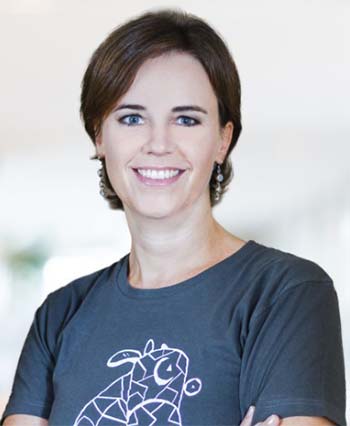

Encha has a 46.5% shareholding in PMT
25 July 2022 | By IT-Online
Published in IT-Online
Digital Wallet Enables Financial Inclusion in Africa
Mukuru Wallet Lowers the Entry Barriers to FinTech Services
As we enter into the third decade of the twenty-first century, financial inclusion is still as remote for many Africans as it has always been.
Despite near-universal connectivity and digitalisation across the continent, many consumers are still trapped within a cash-based economy with all the inconveniences and punitive costs associated.
Now, Mukuru, which already operates in more than 18 countries around the world, is launching an electronic wallet that bridges another gap, giving consumers a more convenient digital alternative to cash.
Mukuru is a FinTech business that was set up especially to service Africans and their specific needs, initially enabling remittances mostly from members of the African migrant diaspora sending money to family members back home.

Sandy Rheeder, CIO of Mukuru
Mukuru’s CIO, Sandy Rheeder, explains that since the company already enables payments to consumers throughout the continent, it now wants to empower the people receiving those funds by giving them a value store.
“There is a lot of money that comes in, moves around, and then moves out. For instance, the flows of money from the UK into the SADC (Southern African Development Community) countries are huge.
“The fact is that many African consumers, even those in remote regions, have the potential to be part of the digital ecosystem since they receive funds on their mobile phones.
“But they still convert those funds to cash rather than continuing on the digital journey of financial inclusion,” Rheeder says.
“Since they are coming from this cash economy, we wanted to help people step on to a digital platform with a simplified product that allows them to store value.
“Once they have a digital place to store value, they are well on the way to becoming consumers of other digital services.
“The Mukuru Wallet essentially acts as a consumer’s first digital account,” Rheeder adds.

Michael Cook, Head of Wallet and VAS at Mukuru
Michael Cook, Head of Wallet and VAS at Mukuru, says the target market for the product is the low-income consumer who would typically use cash for all transactions.
“Cash is expensive for people to use,” he explains. “Take the simple case of buying prepaid electricity. If you don’t have the ability to do it digitally, you have to take a taxi into town, buy an electricity token, then get back home. The cost in money and time is huge.
“But if you have a digital wallet, a store of value, you can buy electricity from home. It’s much simpler, and you save that time and money.”
Rheeder adds: “An electronic wallet gives consumers financial control and takes the anxiety out of transacting in cash.
“It is particularly empowering when it’s from a business like Mukuru which has the licences required to enable cross-border flows and typical wallet applications.”
The Mukuru Wallet will launch in Botswana and, following a local pilot phase, will roll out across other African territories.
The company believes the timing is right for the product, with the COVID-19 pandemic having highlighted the need for more digital services.
With lockdowns and fear of infection blocking people from travelling into town to redeem their funds, an electronic wallet has become a vital next step in the process.
“Now we can digitise both sides of the equation – linking remittances to a wallet that allows the end consumer to buy services or draw cash as they need,” Rheeder explains.
Mukuru Wallet can be accessed on any mobile phone, via USSD, a mobile website or on WhatsApp, so it is inclusive and available to all users.
“Because it is enabled through USSD delivery, a ubiquitous mobile channel, it offers incredible power in any mobile device,” says Rheeder. “You don’t need an expensive smartphone, or pricey contracts, but can use whatever device you have.
“It significantly lowers the barriers to entry in these marketplaces.”
The Mukuru Wallet runs on a high-speed wallet ledger provided by Pattern Matched Technologies and is hosted on AWS.
Indeed, Mukuru’s full technology stack runs on AWS, which allows it to launch inclusive financial services in numerous countries.
“AWS gives us incredible leverage across its entire footprint,” Cook says. “As well as security, it also gives up the speed and agility to automatically scale as the wallet product grows.
“For us, AWS is a massive enabler in terms of creating a service that we can launch SADC-wide.”

Pieter Janse van Rensburg, Chief Technology Officer of Pattern Matched Technologies/p>
Pieter Janse van Rensburg, Chief Technology Officer of Pattern Matched Technologies, explains that his company has a long history of working with wallets as well as enabling them in the South African and SADC contexts.
“AWS shares our vision of global enablement,” he adds. “We get all the benefits of the big machine that is AWS, enabling us to build systems while AWS sorts out security, scaling and global enablement.”
PMT’s high-speed value ledger and journaling, driven by a configurable Chart of Accounts, becomes the Mukuru Wallet’s value store on AWS, providing for account functionality and ledgering.
“Effectively, the wallet becomes an account for the customer,” Janse van Rensburg says. “Our technology provides full industry standards-based accounting to ensure the wallet is trusted and insured.
“And, because our product is scalable, we can grow the service with Mukuru.”
Rheeder says Mukuru was looking for a partner that could provide exceptional accounting prowess at scale, and it found that with PMT.
“We liked the fact that they leveraged the same cloud-based architecture, which could align with us and scale to our requirements.
“Mukuru has a presence across around 100 remittance corridors, so we were looking for a company that could give us that exceptional leadership capability, and scale over time without any technical drama.”

Markus Schorn, CEO of Pattern Matched Technology/p>
From PMT’s perspective, the partnership with Mukuru dovetailed with its own business philosophy and ethos, says CEO Markus Schorn.
“With Mukuru, we have always had the same understanding of the way we wanted to do things. Remember, a solution is not about the technology – it is about the business case and the clients it services.”
The two companies also share the ambitious goal of empowering African consumers. “This partnership is about the long-term customer view of improving the lives of 1-billion-plus underserviced customers in Africa,” Schorn says.
Another key player in bringing the Mukuru Wallet to market is First Distribution (FD).
Janse van Rensburg explains that PMT has been working with AWS for about six years, but around the middle of 2020 realised it would gain a lot of value-add from working with a local distributor and thus the partnership with FD was born.
“A value-added distributor is invaluable in a lot of areas, such as financial consolidation of local currencies,” he says. “It also takes us to the next level of engagement with AWS. Because FD works with AWS as well as other partners, we get access to more resources and a bigger knowledge pool.
“Understanding where we wanted to go, FD has helped us build out on the AWS technology, leveraging their footprint and engagement.
“This means we are able to support our clients with longer-lasting and better technology, providing scalability and longevity as we deliver these solutions together.”